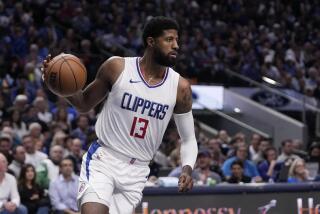George Pleads Innocent; Case May Center on Classified Data
- Share via
WASHINGTON — Clair E. George, former head of CIA covert operations, pleaded innocent Thursday to federal charges that he perjured himself, obstructed investigations and made false statements to cover up the Iran-contra scandal.
The plea came amid indications that his defense, even more than those of defendants before him, will center on highly classified documents.
Disputes over making public the secrets contained in such documents led to dropping or reducing charges against other Iran-contra figures, and George’s lawyer, Richard A. Hibey, focused in the brief court session on the need to obtain substantial amounts of classified papers to begin shaping George’s defense.
After the gray-haired George dropped his characteristic broad smile and answered with a resounding “not guilty” when asked to enter his plea by the court clerk, U.S. District Judge Royce C. Lamberth released him on personal recognizance.
Hibey first hinted last Friday that he might require extensive classified documents when he indicated he hoped to introduce evidence showing that George had risked his life “countless times “ on covert missions during his 33 years with the CIA.
Hibey said he was virtually certain that files the government provides him voluntarily “will not approximate what we want.”
Independent counsel Lawrence E. Walsh, who has been in sharp disputes with the Justice Department over classified information he sought to use in earlier Iran-contra prosecutions, appeared to structure relatively narrow, specific cover-up charges against George to minimize sweeping requests for classified documents.
Nevertheless, Walsh indicated he expected a protracted documents battle in the George case.
In a related development, lawyers for Oliver L. North won new admissions Thursday from Robert C. McFarlane, former President Ronald Reagan’s national security adviser, on how North’s televised congressional testimony helped shape McFarlane’s recollection of events.
The issue is crucial because North’s Iran-contra convictions were set aside last year by a federal appeals court on grounds they may have been tainted by witnesses being influenced by North’s congressional testimony.
Under questioning by North’s attorney, Brendan V. Sullivan Jr., McFarlane told of watching the six days of North’s testimony on television in the company of his two defense lawyers, taking notes, reading transcripts of it and watching television reruns and nightly news shows about it.
“It became part of your memory?” Sullivan asked.
“Yes,” McFarlane responded.
North’s hearing is set to resume Monday.
More to Read
Sign up for Essential California
The most important California stories and recommendations in your inbox every morning.
You may occasionally receive promotional content from the Los Angeles Times.












